|
|
|
Sort Order |
|
|
|
Items / Page
|
|
|
|
|
|
|
| Srl | Item |
| 1 |
ID:
070720
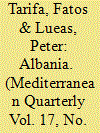

|
|
|
| 2 |
ID:
120906


|
|
|
|
|
| Publication |
2013.
|
| Summary/Abstract |
This essay reviews and analyzes Albania's connections with the Middle East since the era of Enver Hoxha's rule, when ideology was a strong factor in international relations. Since the end of the Cold War, Albania has been most interested in developing political, economic, and cultural ties, especially with Turkey, Israel, and the Arab states of the Persian Gulf region. Through its modern history, Albania has been a good example of a politically and economically weak state exercising a fairly consistent asymmetric foreign policy based on the support of great powers and their allies.
|
|
|
|
|
|
|
|
|
|
|
|
|
|
|
|
| 3 |
ID:
060345
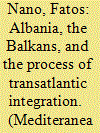

|
|
|
| 4 |
ID:
076603
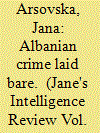

|
|
|
| 5 |
ID:
124336
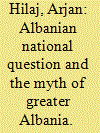

|
|
|
|
|
| Publication |
2013.
|
| Summary/Abstract |
To know what the Albanian National Question (ANQ) is, one should learn it not from what its neighbors, namely Serbia and Greece, have to say, but from a more direct and reliable source, the voice of the Albanians themselves. No nation is in a position in which it can express in a realistic way the needs, rights and aspirations of a different nation in the same way as an individual cannot be an exact representative for anyone but himself. For many years the Western countries used to rely on either Serbian or Greek lenses for the ANQ. In the late 1990s the U.S.-led intervention against Serbia over Kosovo on humanitarian grounds and the Albanian insurgency in Macedonia has contributed to an altered power balance in the region. The neighbors frightened by the power shift in the Southern Balkans use their propaganda machinery to express the danger posed by the alleged Greater Albania scheme in order to demonize and morally downgrade the ANQ. However, one can easily see that Albanians since the creation of their state have not, are not, and will not pursue an irredentist agenda toward their neighbors.
|
|
|
|
|
|
|
|
|
|
|
|
|
|
|
|
| 6 |
ID:
073138
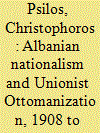

|
|
|
| 7 |
ID:
171096
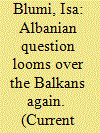

|
|
|
|
|
| Summary/Abstract |
Brussels and Washington had imposed a regime that subordinated the long-term goals of Albanians to the economic and political agendas of the Western powers.
|
|
|
|
|
|
|
|
|
|
|
|
|
|
|
|
| 8 |
ID:
051509
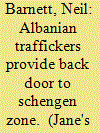

|
|
|
| 9 |
ID:
133689
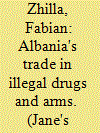

|
|
|
|
|
| Publication |
2014.
|
| Summary/Abstract |
With a new movement attempting to get to grips with organized crime in Albania. Fabian Zhilla examines trends in drug trafficking into Europe and the growth in contract killings arising from a developing market in arms and explosives.
|
|
|
|
|
|
|
|
|
|
|
|
|
|
|
|
| 10 |
ID:
065013
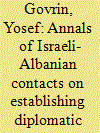

|
|
|
| 11 |
ID:
107148
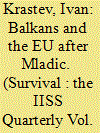

|
|
|
|
|
| Publication |
2011.
|
| Summary/Abstract |
Ten years after the last war in the region, the Balkans is still an assemblage of frustrated protectorates and weak states. Bosnia and Kosovo are trapped in the labyrinthine politics of semi-independence; Albania, Macedonia and Montenegro are small and claustrophobic republics with populist and divisive governments and opposition forces that are discouraged and discouraging at the same time. Serbia has not yet made up its mind how to reconcile its position on Kosovo with its aspiration to join the European Union. Croatia has succeeded in its accession talks with the EU, which closed on 30 June 2011, but the mood of the public is dire due to mismanagement and corruption scandals. The Balkans currently reflects a mixture of Greek-style economic problems, Berlusconi-style politics and Turkish-level hopes when it comes to joining the EU. With Italy and Greece facing deep political and economic troubles of their own, the Balkans has lost its natural advocates for EU membership.
|
|
|
|
|
|
|
|
|
|
|
|
|
|
|
|
| 12 |
ID:
104429
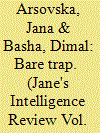

|
|
|
| 13 |
ID:
110976


|
|
|
|
|
| Publication |
2012.
|
| Summary/Abstract |
The choreography of a typical human rights investigation goes like this: Researchers interview victims and witnesses and write their report. The local media cover it -- if they can. Then those accused dismiss it; you have nothing more than stories, it's one word against another, the sources are biased, the evidence faked. And it goes away.
|
|
|
|
|
|
|
|
|
|
|
|
|
|
|
|
| 14 |
ID:
101752
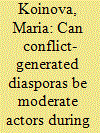

|
|
|
|
|
| Publication |
2011.
|
| Summary/Abstract |
Conflict-generated diasporas are considered likely to maintain radical behaviours. This article seeks to explain why and how they nevertheless adopt moderate claims, especially when advocating highly sensitive issues such as state sovereignty. Focusing on groups in the US I investigate the Lebanese diaspora linked to the pro-sovereignty movement in Lebanon (2000-2005) and the Albanian diaspora linked to Kosovo's independence movement (1999-2008). The contentious episodes take place during the original homeland's post-conflict reconstruction. Embedded in the literatures on diasporas, conflicts, and transnational social movements, this article argues that instrumental approach towards the achievement of sovereignty explains why conflict-generated diasporas adopt moderate behaviours. Diasporas hope that by linking their claims to a global political opportunity structure of 'liberalism' they 'play the game' of the international community interested in promoting the liberal paradigm, and thus expect to obtain its support for the legitimisation of their pro-sovereignty goals. Diaspora entrepreneurs advance their claims in a two-step process. Initially they use frame bridging and frame extension to formulate their existing grievances. Then, an increased responsiveness from their host-state emerges to sustain their initial moderation. While individuals or groups in diaspora circles occasionally issue threats during the contentious episodes, the majority in the diaspora consider moderate politics as their dominant behaviour.
|
|
|
|
|
|
|
|
|
|
|
|
|
|
|
|
| 15 |
ID:
057777


|
|
|
| 16 |
ID:
126852
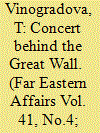

|
|
|
|
|
| Publication |
2013.
|
| Summary/Abstract |
The article analyzes certain aspects of the creative work of the Albanian writer and poet Ismail Kadaré (b. 1936), living in France since 1990. He is a well-known author in the West, winner of the 2005 Booker Prize, but Russian readers are not familiar with his works so far. I. Kadaré wrote much about communist dictatorship and in this respect he can be compared to quite a few writers of East Europe. He succeeded in finding his own unique style in describing the destiny of his Motherland under the dictatorship of Enver Hoxha.
In his novel Concert (1978-1988) Kadaré describes the rupture of Albanian-Chinese relations in the mid-1970s, and also the influence of policy on the life of common people in Tirana, the capital of Albania. The satirical bent of the novel, and his description of the Chinese party nomenklatura evoke discussion to this day on whether the author could be regarded as nationalistic and accused of anti-Chinese sentiments.
|
|
|
|
|
|
|
|
|
|
|
|
|
|
|
|
| 17 |
ID:
115093
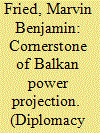

|
|
|
|
|
| Publication |
2012.
|
| Summary/Abstract |
This article discusses the under-researched topic of Austro-Hungarian foreign policy towards Albania during the First World War. It argues firstly that Albania's location was geo-strategically vital to both Austria-Hungary and Italy, and that only co-operation helped keep Albania's neutrality intact and generally protected the country against its hostile neighbours. The analysis then outlines that when the Austro-Italian alliance broke down in 1915, Austria-Hungary attempted to secure Albania's neutrality as a means of exercising indirect control over the country. Finally, once Central Power troops conquered most of Albania, the highest civil-military echelon in Vienna suffered serious strains as the Foreign Ministry attempted to retain Albanian independence and neutrality whilst the army desired its annexation. The Albanian neutrality case study is a prime example of a state unable to ensure or even influence its own neutrality by force, diplomacy, or the trade of vital resources, and whose geo-political position made control of the region vital. Drawing upon Hungarian and German-language sources, this article addresses a striking omission in First World War Balkan historiography, discusses a forgotten neutrality example, and provides insights into Austro-Hungarian policymaking towards this vital Adriatic territory.
|
|
|
|
|
|
|
|
|
|
|
|
|
|
|
|
| 18 |
ID:
119614
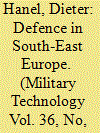

|
|
|
|
|
| Publication |
2012.
|
| Summary/Abstract |
After the collapes of Soviet Union in 1991, the disintegration of Yugoslavia in 2002, and EU and NATO enlargement, South-East Europe became a region characterised by fundamental political, economic and military change.
|
|
|
|
|
|
|
|
|
|
|
|
|
|
|
|
| 19 |
ID:
156342
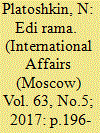

|
|
|
|
|
| Summary/Abstract |
Back in the 15th century, the great Albanian warrior George Castriot, who is also known as Skanderbeg1 (a corruption of the name Iskender Bey given to him by the Turks as a respectful comparison to Alexander the Great), single-handedly fought Ottoman expansion in the Balkans for decades. The pope welcomed Skanderbeg in his residence, and Rembrandt considered it an honor to paint a portrait of him. The West, with its profuse espousal of Christian values, promised help to Albania, but, as usual, failed to keep its word. Incidentally, Skanderbeg was portrayed in the Soviet-Albanian film The Great Warrior Skanderbeg, which came out in 1953 and was directed by Sergey Yutkevich, a Soviet director and screenwriter. The movie was a remarkable event, and what made it so was not only the cinema debut of brilliant Soviet actor Yury Yakovlev but also the directing prize received from the Commission Supérieure Technique of the 1954 Cannes Film Festival. In 2012, the movie was restored to mark the centenary of Albania's independence. It remains the world's best-known film about Albania.
|
|
|
|
|
|
|
|
|
|
|
|
|
|
|
|
| 20 |
ID:
132691


|
|
|
|
|
| Publication |
2014.
|
| Summary/Abstract |
In this article, we explore the long-run cointegration between output, capital and energy consumption, in per worker terms, for Albania, Bulgaria, Hungary and Romania. We use the augmented Solow (1956) model and the ARDL bounds procedure (Pesaran et al., 2001) to examine the short-run and long-run effects of energy and capital on output (in per worker terms). We also conduct causality test using the Toda and Yamamoto (1995) non-causality procedure. Our results show the existence of long-run cointegration between output per worker and energy per worker for all the four countries. We find that energy per worker have a dynamic short-run positive effect in Albania (0.37%), Bulgaria (0.25%), Hungary (0.36%) and Romania (0.68%), and a long-run positive effect in Bulgaria (0.32%) and Romania (0.63%) which duly indicate that energy consumption has a momentous long-run effect in these two countries. The causality results indicate a unidirectional causation from output per worker to energy per worker for all the four countries, and from capital per worker to energy per worker for Albania and Romania. Consequently, a balance between effective energy consumption and sound energy conservation policies are likely to support economic growth in the four countries.
|
|
|
|
|
|
|
|
|
|
|
|
|
|
|
|
|
|
|
|
|